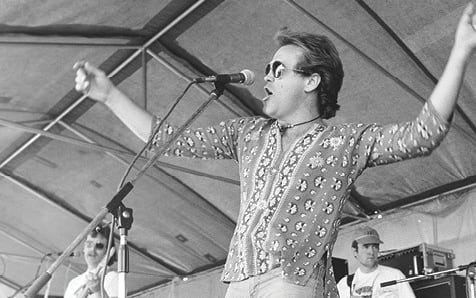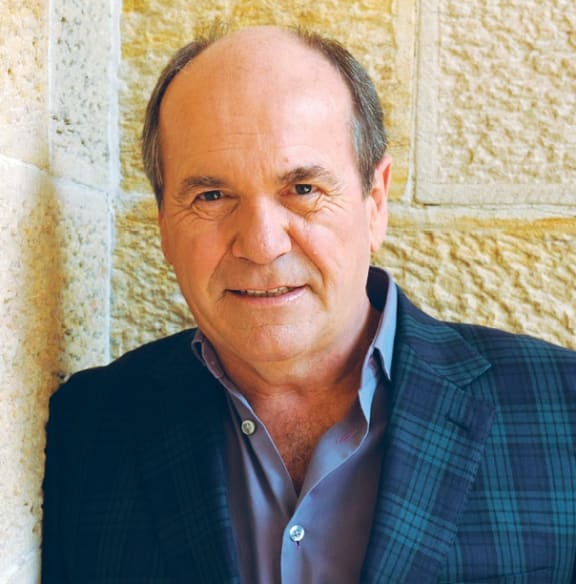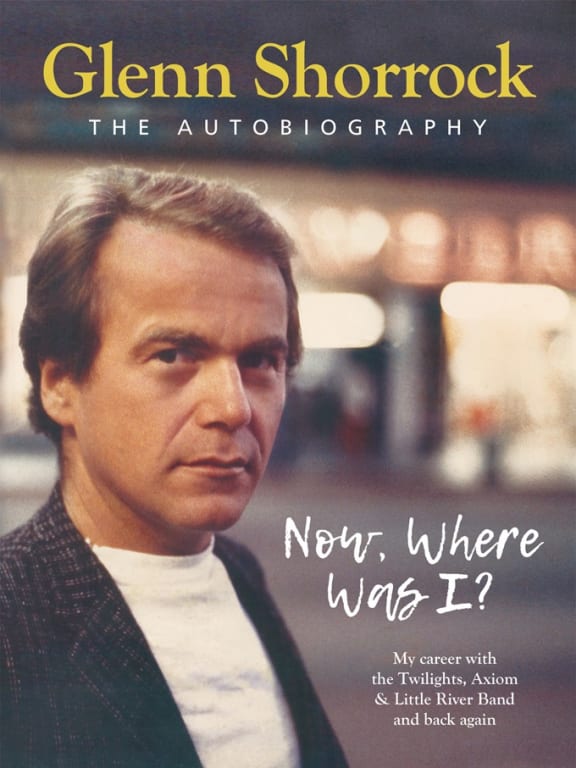Glenn Shorrock fronted Little River Band in their 1970s heyday and also wrote some of the bands biggest hits.

Glenn Shorrock, Little River Band, 1976. Photo: Bob King
Little River Band were among a select few Australian bands of that era that had huge international success. In particular, the USA took to their trademark sophisticated harmonies, skilful playing and songcraft.
The group has sold 30 million records, had 20 Billboard Top 20 hits and garnered multimillions of radio airplays for yacht rock classics such as 'Reminiscing', 'Cool Change', 'Lonesome Loser', 'Lady', 'Help is on its Way' and 'Home on Monday'.
Shorrock, now 73, has written a memoir Now Where Was I? looking back on more than 50 years in show business.
"I went for a lot of years saying 'who cares?', then a lot of people said 'we care and you should write it down'. I wish I'd written a diary, it would have made it a lot easier.
"I've been thinking about a sequel and the next one will be called 'I've just remembered'."
Like many Australian musicians of his generation - the Gibb brothers, Stevie Wright, Bon Scott and Jimmy Barnes - Shorrock's family emigrated from the UK when he was a boy.
"I grew up happily post-war until 1954 when my father announced we were going to migrate to Australia.
"Dad was just fed up with what went on in the war. He was a peacenik before peaceniks were famous. He was disturbed by what went on and wanted to take his family to somewhere more stable, and you couldn't get much more stable than Australia at the time - it was still in black and white wasn't it?"
Soon, the teenage Shorrock - living in a hostel in Adelaide with his family - came across rock 'n' roll and had, he says, an epiphany.
"It was 'Heartbreak Hotel', this was an epiphany as it were. Lying on a bed 108 degrees fahrenheit in a pretty basic migrant hostel and on the ABC, and I hear this echoing … 'well since my baby left me' … what the hell's that?
"I ran down the corridor and the ABC announcer said 'that was Elvis Presley with 'Heartbreak Hotel', and now it's back to Frank Chacksfield and his Orchestra.
"I was captivated by that sound, I'd already heard about Bill Haley and rock around the clock but Elvis captured the menace, was a slightly mystical sound, and when I saw what he looked like it all fitted. He was an Adonis and I don't think anybody's been more famous since."
Later, the British invasion caught his ear.

Glenn Shorrock Photo: Tony Mott
"Then of course bam! 1963, it's The Beatles 'Please Please Me', and that changed everything didn't it."
Soon Shorrock was in his own Adelaide band, The Twilights, and something of a local hero. He had a red sports car, a "full head of hair" and could "shake my hips a bit then".
The Twilights followed in the footsteps of the Bee Gees and the Easy Beats and went to London. Shorrock says they were booked in to record three tracks at Abbey Road Studios in 1967.
"Unbeknownst to us, they [The Beatles] were there and when the concierge turned his book around for us to sign in he says 'you picked a bloody good night to come in 'ere, the group's in'.
"So we said 'what group?' That was their nom de plume, and down the page you could see ,the group, the group, the group'.
"It was a magic night. We only had a night there, we recorded three songs 'What's Wrong With the Way I Live', 'Young Girl' and '9.50'.
"And, yes, I crept up the corridor and stuck my ear at the control room and heard these strange lyrics 'Penny Lane' it turned out to be and it was the first sessions of that magic 1967 year when Sgt Peppers was produced."
After The Twilights split, Shorrock formed another legendary Australian band Axiom, which lasted two years before splitting up in London in 1971. Shorrock remained in the UK working as a session singer when he got an offer to join a new Australian band aiming to have a crack at the American market.
"It was a saviour in a way. I was exhausted trying to knock down doors in London. I'd been there four and a half years. I worked for Cliff [Richard] and he paid me a 100 pounds a week for an 8 week series at the London Palladium and I was using that to go back to Australia and pick up whatever pieces I had left of my career here.
Glen Wheatley, a former member of The Masters Apprentices and now a manager, called Shorrock and said a band called Mississippi wanted a new singer.

Photo: Supplied
"I said 'OK, I'll come over and meet these guys' and we sat around with guitars …Graham [Goble] introduced me to a song 'It's A Long Way' and it begins with that acapella 'hey everybody yeah don't you feel that there's something'.
"And I did feel there was something, and that was the beginning of a real purple patch for me, it was great."
The new band settled on a more modest name.
"I called it Little River following a road sign, it was an egalitarian choice. I didn't want to be called Mississippi, I wanted something a little more modest than that!"
Huge success followed, and the band released a string of hits.
"'Reminiscing' is the most played song in Australia, it's been played 5 million times. Gauge that against 'Cool Change' which I've just received a citation that my song 'Cool Change' has been played 2 million times. So Reminiscing is by far has been the most successful LRB song."
Shorrock says he brought an earthier edge to the group and had a "malleable" voice.
"Maybe I was a bit too malleable! That's another story in the book, I was replaced by His Royal Highness John Farnham."
A string of band member replacements has led to confusing and labyrinthine naming rights battles for performances that have gone on behind the scenes for years, as detailed in a chapter of Shorrock's book.
He's continued to work since he left in 1982, but says the 'ghost' of Little River Band remains.
"It still haunts us and especially myself sometimes I think 'be gone!' It's that whole Hamlet situation. But it won't be gone and I don't want it to be gone; the music is still out there and I produced a lot of that music with my voice and writing and such.
"So it's a legacy I'll take with me with fond memories and with some not so fond memories, but that's life. Shit happens."
Shorrock says he made a pact with himself when he first turned professional.
"That I would have the respect of my peers, it'll be my career and I would be doing it at the age of 50. Well, I'm way past all of that now and that's my measure of success."
Glenn Shorrock's autobiography Now Where Was I? is published by New Holland Publishers.

